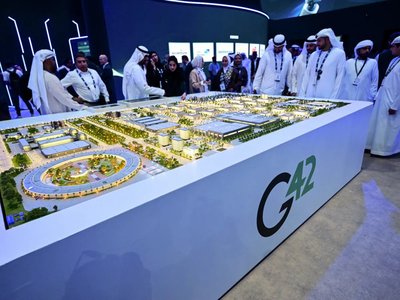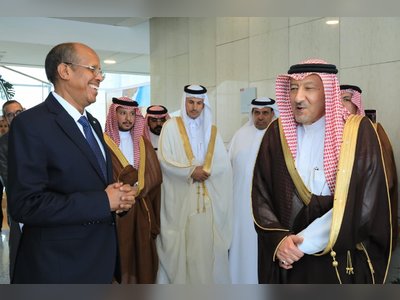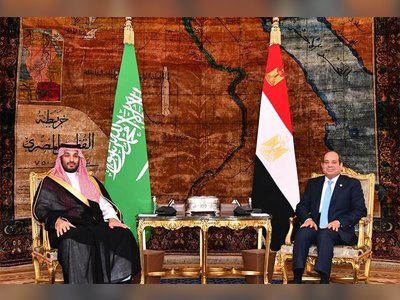
Egypt female candidate angers feminists by glorifying the patriarchy
A female candidate running in Egypt’s upcoming legislative elections has been glorifying men and the patriarchal system, raising the ire of feminists across the nation who have worked for years to change society’s view that women are inferior.
A female candidate for the Oct. 24-25 elections for Egypt's House of Deputies is coming under fire for glorifying men and demeaning women.
Wafaa Salaheddine, who is running as an independent in the Nile Delta province of Menoufia, says women have to serve their husbands as servants.
Salaheddine, who is not married, even backs polygamy and says men have the right to get married to more than one woman at a time.
This is touching a raw nerve with the nation's feminists, who have long struggled to change stereotypes about women.
People such as Salaheddine, they say, are casting aside women's struggle for equality in a society that has grown accustomed to considering them inferior to men and marginal family members.
“People like this candidate are dangerous in that they are able to reach a large number of people,” Nehad Abul Qomsan, the head of local nongovernmental organization Egyptian Center for Women's Rights, told Al-Monitor. “She spreads hate against women, even as she may represent these women in parliament if she wins the elections.”
Salaheddine uses her YouTube channel to spread the word about her program and to reach out to voters in her constituency.
One video on the channel shows her talking with one of her constituents and promising to solve the problems he and fellow constituents face, including rampant unemployment.
In a way, Salaheddine represents a growing trend in Egypt, one that reveres the patriarchy and supports polygamy.
There are many icons of this trend now and — surprisingly enough — most of them are women. One of them, Mona Aboshanab, a media figure, argues that only cowards abstain from getting married to more than one woman at a time. She even encourages fathers and male members of the family to impose their full control over female members.
This way of thinking goes hand in hand with an old Egyptian tradition of considering women mere followers or subordinates of men.
This tradition is detailed in the works of Egyptian Nobel laureate Naguib Mahfouz, especially the Cairo Trilogy, the first part of which, "Palace Walk" — a story about the structure of Egyptian families and patriarchal dominance in the past century — highlights the long struggle Egyptian women needed to stage in order to be viewed as equal members of society.
The struggle against male dominance seems to have reached a higher level with the emergence of a new generation of Egyptian feminists who campaign fiercely against women's low status within families and the institution of marriage.
Apart from asserting that women are, not equal to, but even better and more qualified than men, the same feminists campaign against polygamy, a practice acceptable in Islam (under certain conditions), but one that is becoming socially unacceptable to some Egyptians.
Nonetheless, these views are being challenged by people such as Salaheddine.
Salaheddine did not return calls from Al-Monitor or answer messages via the messaging platform WhatsApp requesting comment.
Nonetheless, one psychologist saw an electoral campaigning trick in her remarks.
Leading psychologist Mohamed Hani said Salaheddine might not be a strong believer in what she says.
But at the least, he added, she uses this rhetoric to curry favor with male voters.
“She uses this negative propaganda against women to win men over,” Hani told Al-Monitor. “After all, men make up the bulk of voters in any election.”
Around 61 million Egyptians are registered to vote. Almost half of these voters are women. However, more men tend to show up at polling stations.
A sizable portion of the 4,006 candidates running as independents in the 143 constituencies specified for independent candidates are women.
Egypt's election law specifies that 25% of the 596 seats in the House of Deputies go to women.
The same law requires half the lists of the political parties contesting 284 seats be of women candidates.
Independent female candidates and those included on the political party lists are campaigning fiercely, including on social media and on television, to persuade voters.
On the streets of the Egyptian capital, Cairo, and other cities, posters of female candidates take their places proudly beside those of male candidates.
Some of the female candidates hold street rallies and others tour their constituencies to talk with voters directly one on one.
“I believe the female candidates will compete strongly in the elections this time,” Nadia Helmi, a professor of political science at Beni Suef University, told Al-Monitor. “Women have become main partners in the political process in this country.”
Women are apparently trying to capitalize on the gains they made in the House of Deputies elections in 2015. Women won 87 seats out of a total of 596 seats in the elections, which amounted to around 15% of the total seats of the house.
Salaheddine, 26, is one of the youngest female candidates.
She is a TV host by profession. She tours the streets of Shebeen el-Kom, the capital of Menoufia province, to talk with ordinary people and appeal to them.
She says her media record as a TV host with the local al-Hadath al-Youm channel and as a newspaper reporter (which she does not mention on her Facebook page) gave her the chance to form an idea about people's problems and the means of solving them. She is aware, she says, that unemployment and poverty are the largest problems facing the people of her constituency. She promises to focus on small projects to economically empower her constituents, including housewives.
But it is her remarks about the status of women and men that have grabbed the attention of almost everybody.
Many women don't like it. “The low view of women is very painful, especially when it comes from women themselves,” Shaimaa Sayed, a housewife in her early 40s, told Al-Monitor. “Some women believe they are inferior beings, but in defending their view, they humiliate other women.”
On Oct. 13, Salaheddine told a local newspaper that regardless of the success women might have in their professional life, they have only one refuge: their husbands' homes.
“I was raised to become a servant of my husband,” Salaheddine said. “This is what our parents taught us.”
Wafaa Salaheddine, who is running as an independent in the Nile Delta province of Menoufia, says women have to serve their husbands as servants.
Salaheddine, who is not married, even backs polygamy and says men have the right to get married to more than one woman at a time.
This is touching a raw nerve with the nation's feminists, who have long struggled to change stereotypes about women.
People such as Salaheddine, they say, are casting aside women's struggle for equality in a society that has grown accustomed to considering them inferior to men and marginal family members.
“People like this candidate are dangerous in that they are able to reach a large number of people,” Nehad Abul Qomsan, the head of local nongovernmental organization Egyptian Center for Women's Rights, told Al-Monitor. “She spreads hate against women, even as she may represent these women in parliament if she wins the elections.”
Salaheddine uses her YouTube channel to spread the word about her program and to reach out to voters in her constituency.
One video on the channel shows her talking with one of her constituents and promising to solve the problems he and fellow constituents face, including rampant unemployment.
In a way, Salaheddine represents a growing trend in Egypt, one that reveres the patriarchy and supports polygamy.
There are many icons of this trend now and — surprisingly enough — most of them are women. One of them, Mona Aboshanab, a media figure, argues that only cowards abstain from getting married to more than one woman at a time. She even encourages fathers and male members of the family to impose their full control over female members.
This way of thinking goes hand in hand with an old Egyptian tradition of considering women mere followers or subordinates of men.
This tradition is detailed in the works of Egyptian Nobel laureate Naguib Mahfouz, especially the Cairo Trilogy, the first part of which, "Palace Walk" — a story about the structure of Egyptian families and patriarchal dominance in the past century — highlights the long struggle Egyptian women needed to stage in order to be viewed as equal members of society.
The struggle against male dominance seems to have reached a higher level with the emergence of a new generation of Egyptian feminists who campaign fiercely against women's low status within families and the institution of marriage.
Apart from asserting that women are, not equal to, but even better and more qualified than men, the same feminists campaign against polygamy, a practice acceptable in Islam (under certain conditions), but one that is becoming socially unacceptable to some Egyptians.
Nonetheless, these views are being challenged by people such as Salaheddine.
Salaheddine did not return calls from Al-Monitor or answer messages via the messaging platform WhatsApp requesting comment.
Nonetheless, one psychologist saw an electoral campaigning trick in her remarks.
Leading psychologist Mohamed Hani said Salaheddine might not be a strong believer in what she says.
But at the least, he added, she uses this rhetoric to curry favor with male voters.
“She uses this negative propaganda against women to win men over,” Hani told Al-Monitor. “After all, men make up the bulk of voters in any election.”
Around 61 million Egyptians are registered to vote. Almost half of these voters are women. However, more men tend to show up at polling stations.
A sizable portion of the 4,006 candidates running as independents in the 143 constituencies specified for independent candidates are women.
Egypt's election law specifies that 25% of the 596 seats in the House of Deputies go to women.
The same law requires half the lists of the political parties contesting 284 seats be of women candidates.
Independent female candidates and those included on the political party lists are campaigning fiercely, including on social media and on television, to persuade voters.
On the streets of the Egyptian capital, Cairo, and other cities, posters of female candidates take their places proudly beside those of male candidates.
Some of the female candidates hold street rallies and others tour their constituencies to talk with voters directly one on one.
“I believe the female candidates will compete strongly in the elections this time,” Nadia Helmi, a professor of political science at Beni Suef University, told Al-Monitor. “Women have become main partners in the political process in this country.”
Women are apparently trying to capitalize on the gains they made in the House of Deputies elections in 2015. Women won 87 seats out of a total of 596 seats in the elections, which amounted to around 15% of the total seats of the house.
Salaheddine, 26, is one of the youngest female candidates.
She is a TV host by profession. She tours the streets of Shebeen el-Kom, the capital of Menoufia province, to talk with ordinary people and appeal to them.
She says her media record as a TV host with the local al-Hadath al-Youm channel and as a newspaper reporter (which she does not mention on her Facebook page) gave her the chance to form an idea about people's problems and the means of solving them. She is aware, she says, that unemployment and poverty are the largest problems facing the people of her constituency. She promises to focus on small projects to economically empower her constituents, including housewives.
But it is her remarks about the status of women and men that have grabbed the attention of almost everybody.
Many women don't like it. “The low view of women is very painful, especially when it comes from women themselves,” Shaimaa Sayed, a housewife in her early 40s, told Al-Monitor. “Some women believe they are inferior beings, but in defending their view, they humiliate other women.”
On Oct. 13, Salaheddine told a local newspaper that regardless of the success women might have in their professional life, they have only one refuge: their husbands' homes.
“I was raised to become a servant of my husband,” Salaheddine said. “This is what our parents taught us.”











